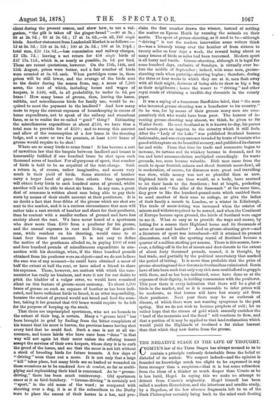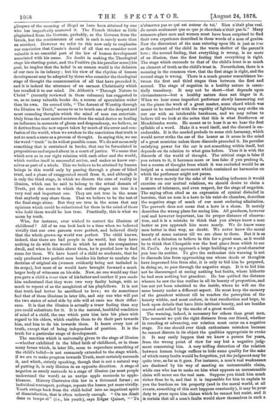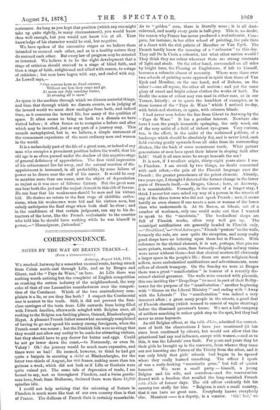THE NEGATIVE STAGE IN THE LIFE OF THOUGHT.
MITE'S law of the Three Stages has always seemed to us to contain a principle curiously detachable from the belief or disbelief of its author. We suspect indeed—and the opinion is founded on knowledge much too slight to be expressed in any form stronger than a suspicion—that it is but some refraction from the ideas of a thinker as much deeper than Comte as he is less lucid, Hegel. In saying this we make no attempt to detract from Comte's originality. Hegel himself has been called a modern Elemcleitus, and the laborious and erudite study, by a Hegelian, of the few obscure fragments left to us of the Dark Philosopher certainly bring back to the mind such fleeting glimpses of the meaning of Hegel as have been attained by one who has imperfectly mastered it. The French thinker as little plagiarised from the German, probably, as the German from the Greek, but the reminiscence of each in each is surely more than an accident. However we refer to this now only to emphasise our conviction that Comte's denial of all that we consider most valuable is no essential part of the law of human development associated with his name. No doubt in making the Theological stage his starting-point, and the Positive (in his peculiar sense) his goal, he implies that the belief in an unseen world is the delusion of our race in its infancy ; but his view of the rhythm of human development may be adopted by those who consider the theological stage of thought the consummation of all that have preceded it, and it is indeed the utterance of an earnest Christianity which has recalled it to our mind. Dr. Abbott's "Through Nature to Christ" (recently reviewed in these columns) has suggested to us, as so many valuable books do, a course of speculation wider than its own. Its second title, "The Ascent of Worship through the Illusion to Truth," seems to us to touch one of the deepest and most consoling thoughts which the mind of man can entertain. Only from the most sacred sources does the mind derive so healing an influence in moments of gloom and despondency, we believe, as it derives from the new aspect taken by much of the error and con- fusion of the world, when we awaken to the conviction that truth is not so much a state as a process of thought. In saying this, we use the word " truth " in its widest possible sense. We do not mean only something that is contained in books, that can be formulated in propositions and argued about in a court of justice. We mean that which sets us in our right relation with each other and the world, which verifies itself in successful action, and makes us know our- selves as part of a whole. This we believe to be attained by human beings in this world only by passing through a phase of blind trust, and a phase of exaggerated recoil from it, and although it is only the third stage, in which we discern the core of reality in illusion, which can be said to belong to the actual domain of Truth, yet the sense in which the earlier stages are true is a very real and important one. They are not true in the sense that anybody may share them. That we believe to be the test of the final stage alone. But they are true in the sense that any opinions which could be substituted for them in the mind of those who hold them would be less true. Practically, this is what we mean by truth.
Who, for instance, ever wished to correct the illusions of childhood ? All of us can look back to a time when we believed vividly that our own parents were perfect, and believed dimly that the whole grown-up world was perfect. The child knows, indeed, that there are bad people in the world, but they have nothing to do with the world in which he and his companions dwell, and when he thinks about them, he is puzzled how to find room for them. We have heard of a child so moderate, that he only produced two perfect men besides his father to confute the doctrine of original sin (women evidently being not included in its scope), but most of us would have brought forward a much larger body of witnesses on his side. Now, no one would say that you gave a child a truer view of his father and mother if you made him understand that they were two very faulty beings, with as much to repent of as the naughtiest of his playfellows. It is not that truth had better be sacrificed to love ; we do sometimes feel that of these illusions in later life, and any one who will put the two states of mind side by side will at once see their differ- ence. It is that the illusion is actually a truer feeling than any you could substitute for it. It is the natural, healthful condition of mind of a child, the one which puts him into his place with regard to his elders, which enables them to do their part towards him, and him to do his towards them. It bears every test of truth, except that of being independent of position. It is the truth for a particular stage of development.
The sanction which is universally given to the stage of illusion —whether exhibited in the blind faith of childhood, or in those many forms which, in later life, seem to reproduce something of the child's belief—is not commonly extended to the stage which, if we are to make progress towards Truth, most certainly succeeds it, and which, strictly speaking, though that is not a natural way of putting it, is only illusion in an opposite direction. A stage of negation as surely succeeds to a stage of illusion (as most people understand the word) as an unripe apple succeeds to apple- blossom. History illustrates this law in a thousand forms ; an individual retrospect, perhaps, repeats the lesson yet more vividly. Youth swings back from the child-belief into an impatient spirit of dissatisfaction, that is often unlovely enough. "On me disait dans ce temps-ci" (i.e., his youth), says Edgar Quinet, " ' Tu
n'observes pas ce qui eat autour de toi.' Rien n'etait plus vrai. Je savais seulement que ce qne je cherchais n'etait pas la." Many common-place men and women must have been surprised to find their own experience described in these words of a man of genius. Now the discontent of the man entering upon life is just as true as the content of the child in the warm shelter of the parent's love ; the second feeling, that everything is wrong, is no more of an illusion, than the first feeling that everything is right. The stage which succeeds to that of the child's trust is as much an element of truth as the child's trust is. Nevertheless, there is a meaning in the common view, that the first stage is right, and the second stage is wrong. There is a much greater resemblance be- tween the first and third stages than between the first and second. The stage of negation in a healthy nature is essen- tially transitory. It may not be short—that depends upon circumstances—but a healthy nature does not linger in it. When we hear some imperfect performer slowly hammering out on the piano the work of a great master, some chord which was meant to be resolved with the rapidity of lightning may strike on our ear with an intolerable harshness, and we may refuse to believe till we look at the notes that this is what Beethoven or Mendelssohn wrote. He meant us to hear it as we hear the first syllable of a word. Make it a word itself, and the discord is sin- endurable. It is the needed prelude to some rich harmony, which would never strike the ear of the hearer as it arose in the mind of a great musician unless those discords preceded it. Its peculiar satisfying power for the ear is not something within itself, but depends on its relation to what goes before. Thus it is with the discords of the world of thought. The critical stage is false if you return to it, it becomes more or less false if you prolong it, but a course of thought from which it was excluded would be as insipid as a musical movement which contained no harmonies on which the performer might not pause.
If it were merely for the sake of the healing influence it would exercise on our mutual relations, we should desire to claim a measure of tolerance, and even respect, for the stage of negation. The saying often cited as an expression of cynical disbelief in heroism, that no man is a hero to his valet-de-chambre, describes the negative stage of much of our most enduring admiration. The proverb does not mean that a hero is a sham. It merely describes the wrong place for seeing him. All goodness, however- real and however important, has its proper distance of observa- tion, and it is a mistake to think that you always know a man better as you approach him more nearly. We do know some men better in that way, no doubt. We never know the moral beauty of some natures till we are close to them. But it is as much of a delusion to believe in this for a great man, as it would be to think that Cheapside was the best place from which to see St. Paul's. As you approach a large building or a great character- you lose its outline. To give the enthusiast this warning is not to dissuade him from approaching one whose deeds or thoughts have impressed him from afar, it is only to bid him be prepared, in doing so, to pass through the negative stage. It is to bid him not be discouraged at seeing nothing but faults, where hitherto- he had seen nothing but grandeur. He has quitted the distance whence he saw the fine outline in all its beauty of proportion, and has not yet been admitted to the inside, where he will see the same beauty under a different aspect. He must keep the memory of the grandeur without till he reaches the perception of the beauty within, and must endure, in that recollection and hope, to look upon details that have little intrinsic beauty, and are besides marred and soiled by the smoke of a great world.
The warning, indeed, is necessary for others than great men. The moment we quit the right distance from our friend, whether in receding or advancing, our relation must enter on a negative stage. No one should ever think enthusiasm mistaken because he cannot discern in its object the qualities appropriate to evoke it. It may easily happen that we know a person for years, from the wrong point of view for any but a negative judg- ment concerning him. A very trifling distortion of the relation between human beings suffices to hide some quality for the Bake of which many faults would be forgotten, yet the judgment may be
true, as far as it goes. For instance, a man's real weaknesses are disclosed by his way of meeting an unreasonable claim, while one who has to make on him what appears an unreasonable claim will never see the real man. Suppose you think him much richer than he is, and that it is impossible for him to explain to you the burdens on his property (and in the moral world, at all events, something of this sort happens constantly), it may be your duty to press upon him claims which he cannot but resist, and it is certain that all a man's faults would show themselves in such a
resistance. As long as you kept that position (which any one might take up quite rightly, in many circumstances), you would know them well enough, but you would not know him at all. Your knowledge of his character would be real, but negative.
We have spoken of the successive stages as we believe them intended to succeed each other, and as in a healthy nature they do succeed each other. But every law of progress may be arrested or inverted. 1Ve believe it to be the right development that a stage of criticism should succeed to a stage of blind faith, and then a stage of faith, enlightened and allied with reason, to a stage of criticism ; but men have begun with any, and ended with any. As Lowell says,— " Our seasons have no fixed ietums,
Without our ken thoy come and go. At morn our July sunshine burns, At evening all is snow."
As space is the medium through which we discern material things, and time that through which we discern events, so in judging of the inward world we must draw analogies from both, and indeed time, as it concerns the inward life, has many of the qualities of space. It often seems to bring us back to a domain we have visited before ; it often forces us to recognise a before and after which may be inverted, just as any part of a journey may. This sounds metaphysical, but is, we believe, a simple statement of the commonest experience of the most ordinary men and women in the world.
It is a melancholy part of the life of a great man, or indeed of any man who occupies a prominent position before the world, that his old age is so often passed under the shadow of this negative stage of general deficiency of appreciation. The first vivid impression
of his achievement lies far away, and the natural reaction of dis- appointment is increased, in all probability, by some failure of power as be draws near the end of his career. It would be easy to mention more than one name, now the object of depreciation as unjust as it was once of fulsome flattery. But the great man
can bear both the just and the unjust element in this ebb of favour. He can bear that his weaknesses should be seen and his virtues bid. He desires no return to the first stage of childlike enthu- siasm, when his weaknesses were hid and his virtues seen, but calmly anticipates the final stage when both shall be clear ; and in the confidence of that certain judgment, can say to his de- tractors of the hour, like the French ecclesiastic to the courtier who told him he should have nothing while he was himself in power,—" Monseigneur, fattendrai."
































 Previous page
Previous page